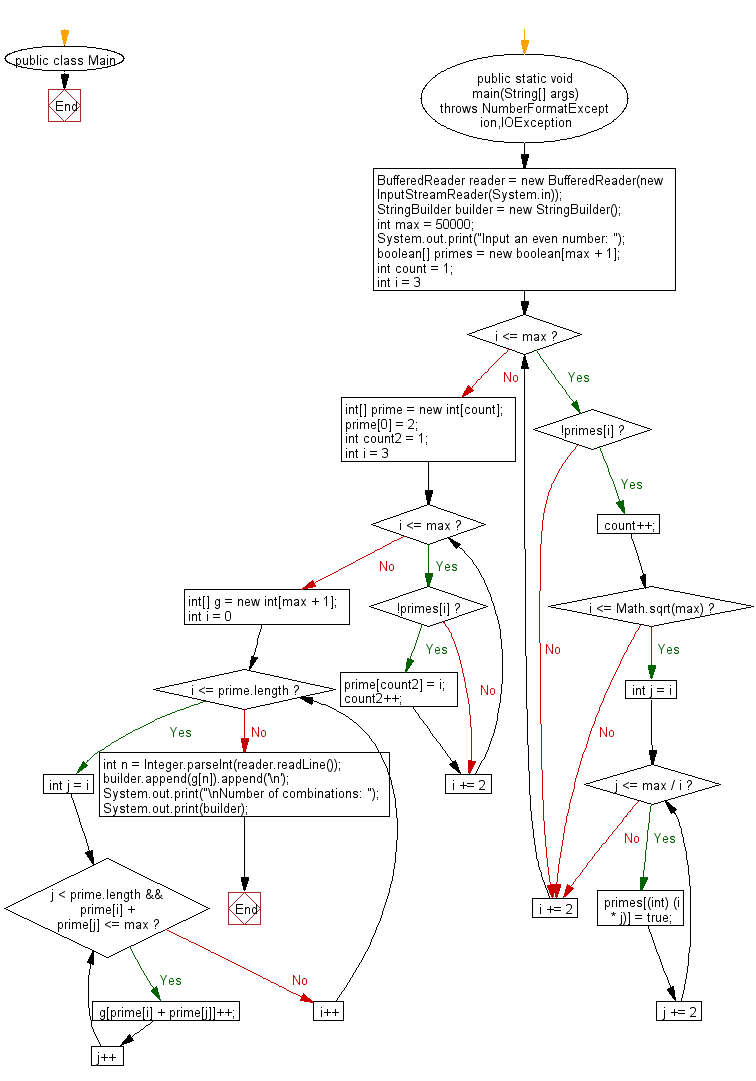Java: Accept a even number from the user and create a combinations that express the given number as a sum of two prime numbers
Goldbach Combinations of Even Number
Write a Java program that accepts an even number (n should be greater than or equal to 4 and less than or equal to 50,000, a Goldbach number) from the user and creates combinations that express the given number as a sum of two prime numbers. Print the number of combinations.
Goldbach number: A Goldbach number is a positive even integer that can be expressed as the sum of two odd primes.[4] Since four is the only even number greater than two that requires the even prime 2 in order to be written as the sum of two primes, another form of the statement of Goldbach's conjecture is that all even integers greater than 4 are Goldbach numbers.
The expression of a given even number as a sum of two primes is called a Goldbach partition of that number. The following are examples of Goldbach partitions for some even numbers:
6 = 3 + 3
8 = 3 + 5
10 = 3 + 7 = 5 + 5
12 = 7 + 5
...
100 = 3 + 97 = 11 + 89 = 17 + 83 = 29 + 71 = 41 + 59 = 47 + 53
Visual Presentation:
Sample Solution:
Java Code:
// Importing necessary classes for input/output operations
import java.io.BufferedReader;
import java.io.IOException;
import java.io.InputStreamReader;
// Main class named "Main"
public class Main {
// Main method to execute the program, throws NumberFormatException and IOException
public static void main(String[] args) throws NumberFormatException, IOException {
// Creating BufferedReader and StringBuilder objects for efficient input and output
BufferedReader reader = new BufferedReader(new InputStreamReader(System.in));
StringBuilder builder = new StringBuilder();
// Setting the maximum value for calculations
int max = 50000;
// Prompting the user to input an even number
System.out.print("Input an even number: ");
// Creating a boolean array to store information about prime numbers
boolean[] primes = new boolean[max + 1];
// Initializing count variable to count prime numbers
int count = 1;
// Looping through odd numbers to find prime numbers using the Sieve of Eratosthenes algorithm
for (int i = 3; i <= max; i += 2) {
if (!primes[i]) {
count++;
// Marking multiples of the current prime number as non-prime
if (i <= Math.sqrt(max)) {
for (int j = i; j <= max / i; j += 2) {
primes[(int) (i * j)] = true;
}
}
}
}
// Creating an array to store prime numbers
int[] prime = new int[count];
prime[0] = 2;
int count2 = 1;
// Filling the prime array with prime numbers
for (int i = 3; i <= max; i += 2) {
if (!primes[i]) {
prime[count2] = i;
count2++;
}
}
// Creating an array to store the count of combinations for each sum of two prime numbers
int[] g = new int[max + 1];
// Calculating the count of combinations for each sum of two prime numbers
for (int i = 0; i <= prime.length; i++) {
for (int j = i; j < prime.length && prime[i] + prime[j] <= max; j++) {
g[prime[i] + prime[j]]++;
}
}
// Reading the input value for which we want to find the count of combinations
int n = Integer.parseInt(reader.readLine());
// Appending the count of combinations to the StringBuilder
builder.append(g[n]).append('\n');
// Outputting the number of combinations
System.out.print("\nNumber of combinations: ");
System.out.print(builder);
}
}
Sample Output:
Input an even number: 100 Number of combinations: 6
Flowchart:

For more Practice: Solve these Related Problems:
- Write a Java program to list all Goldbach partitions for an even number and sort them by the difference between the prime pairs.
- Write a Java program to count the number of Goldbach partitions for a given even number using an optimized prime sieve.
- Write a Java program to validate Goldbach's conjecture by checking partitions for all even numbers up to a specified limit.
- Write a Java program to output the smallest and largest prime pairs from the Goldbach partitions of a given even number.
Go to:
PREV : Sum of First n Prime Numbers.
NEXT : Maximum Regions from Straight Lines.
Java Code Editor:
Contribute your code and comments through Disqus.
What is the difficulty level of this exercise?
Test your Programming skills with w3resource's quiz.
